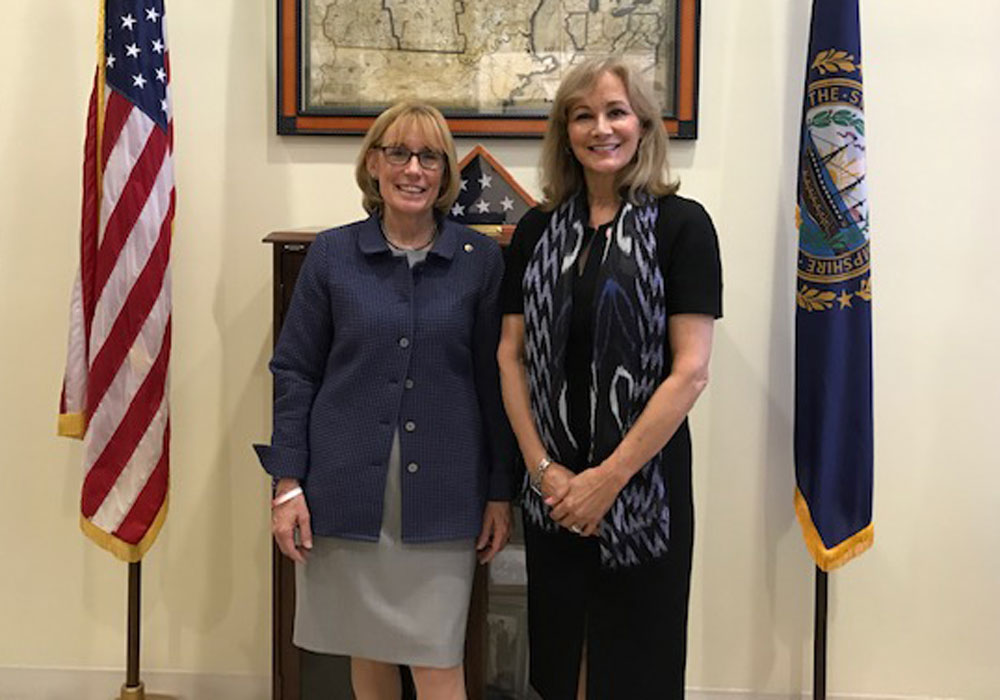While representing ONS in June 2019 at the National Institute for Nursing Research in Bethesda, MD, I met with my state’s congressional delegation to introduce ONS’s health policy legislative agenda to their offices on Capitol Hill. Despite it being one of the hottest days on record for the nation’s capital, the congressional offices offered a cool place for health policy discussions.
ONS’s health policy staff helped me arrange three meetings with my delegates—Representative Chris Pappas (D-NH), Senator Jeanne Shaheen (D-NH), and Senator Margaret Hassan (D-NH). New Hampshire has only four federally elected officials, so I felt a great sense of accomplishment in being able to meet with all but one of them.
Having advocated for ONS and other national nursing organizations in the past, I had some experience in talking about our important messages related to scope of practice, patient-centered care, federal research investments, and workplace safety. However, I was not really prepared for the full display I received. Each meeting reminded me of the elegance and delicacy of democracy. Young and hurried congressional staff busily bounced around buildings, arms full of papers for approval and signatures. Meetings were happening in offices, corridors, and hallways. Famous politicians walked by, offering smiles and friendly nods to constituents visiting for the day. It was an exciting environment, no matter your political persuasion.
Representative Pappas is a newly elected member of the House. To my delight, after meeting with his expert health policy staffer, I learned that Pappas was already a cosponsor of ONS’s signature legislation on palliative care, the Palliative Care and Hospice Education and Training Act (PCHETA). Additionally, his staff said that he was also aware and is fully supportive of oral cancer drug parity and lymphedema sleeve reimbursement. We chuckled together at how easy this advocacy stuff seemed to be, but the ONS policy staff in DC had warned me that very few meetings go this well. After we chatted a little longer with the staffer and offered ONS as an expert resource for all things nursing, cancer, and health, I walked away exhilarated and excited for my next meeting.
Meetings with both of my senate officials were equally as successful. The staff members I spoke with said that the senators were supportive of PCHETA and oral parity in the previous congressional session and would sign onto the legislation again. For New Hampshire, though, the senators were concerned about nursing workforce issues. Currently, nursing students are obtaining their degrees in the state but leaving to seek employment elsewhere—leaving New Hampshire with a dearth of practitioners. It’s a serious issue that’s affecting thousands of patients and putting a real burden on access to affordable health care in the state. A task force is looking into solutions, and nursing organizations like ONS are at the cornerstone of building a stronger employment base in the northeast.
Going into my final meeting, I could see the light at the end of a very long and exciting day. To my surprise, Senator Hassan’s staff called us into the senator’s personal office for a one-on-one meeting with the senator herself. She was in between voting sessions for that day and time was short, but we managed to have a serious conversation about health care and nursing-focused issues. I thanked her for the continued support, and the senator was grateful for ONS’s offer as a resource, vowing to stay in contact and reaching out to include nurses on healthcare issues for the state. We also managed to grab the quintessential Washington, DC, photo op, which now sits nicely in my office.
This trip was a reminder that one person—certainly one nurse—can make a real difference in the advocacy arena. Although my elected officials were already on key legislation, having those in-person meetings as a constituent personally asking for their support is very important and demonstrates the commitment that nurses have for improving patient care. I was proud and humbled to be a small part of this process, and it drove home the point that we can all do so much as nurses to ensure that our profession has a seat at the table. Join ONS’s advocacy team and help your delegates move our Society’s priorities forward together.






